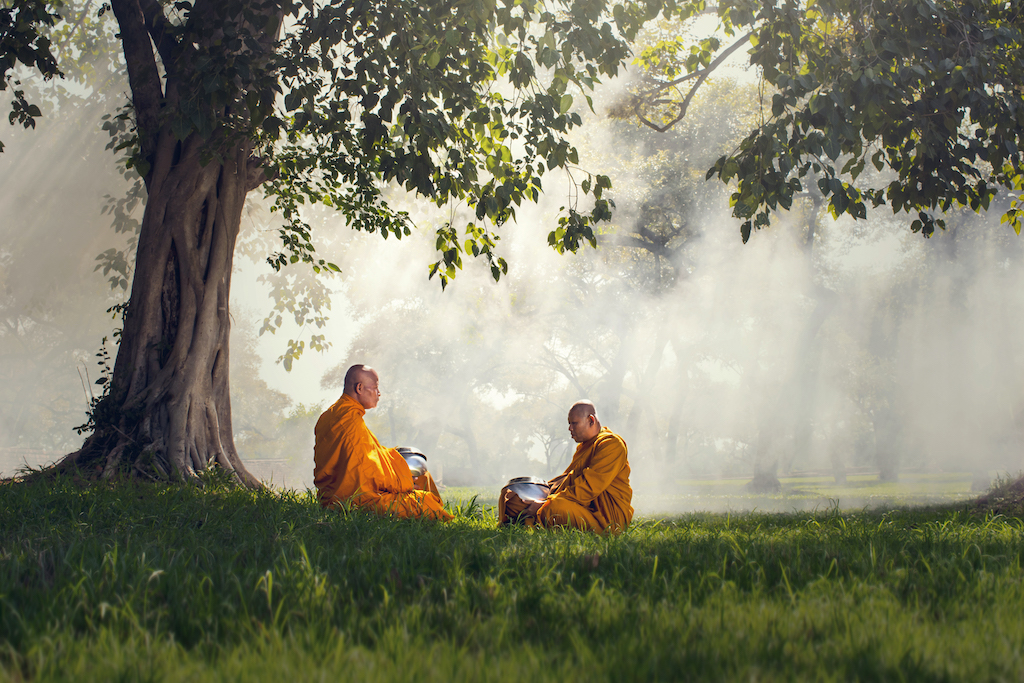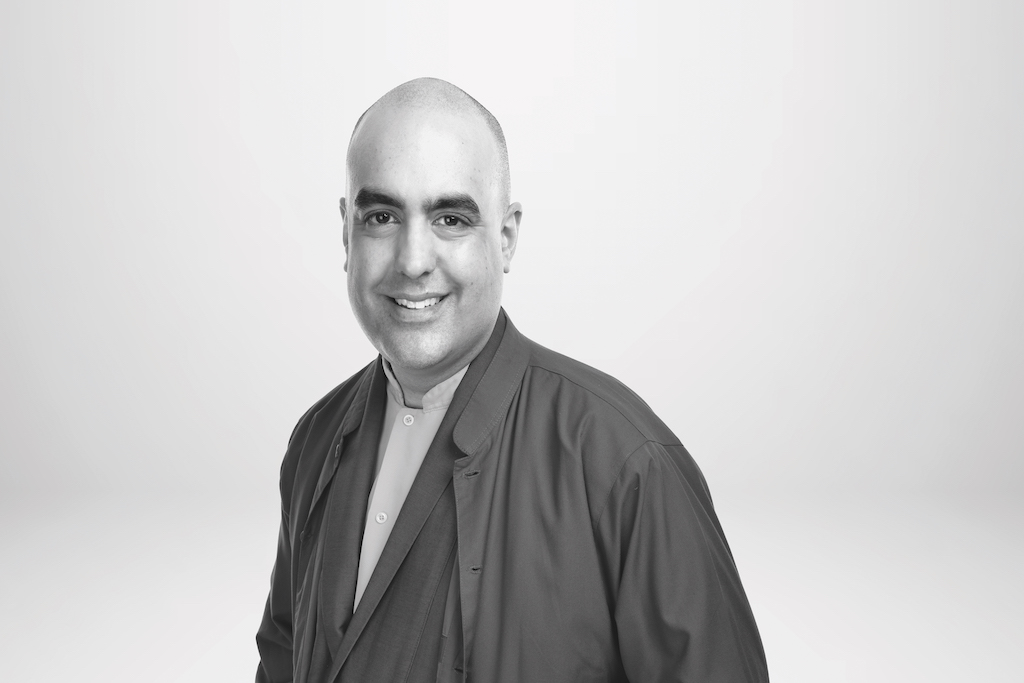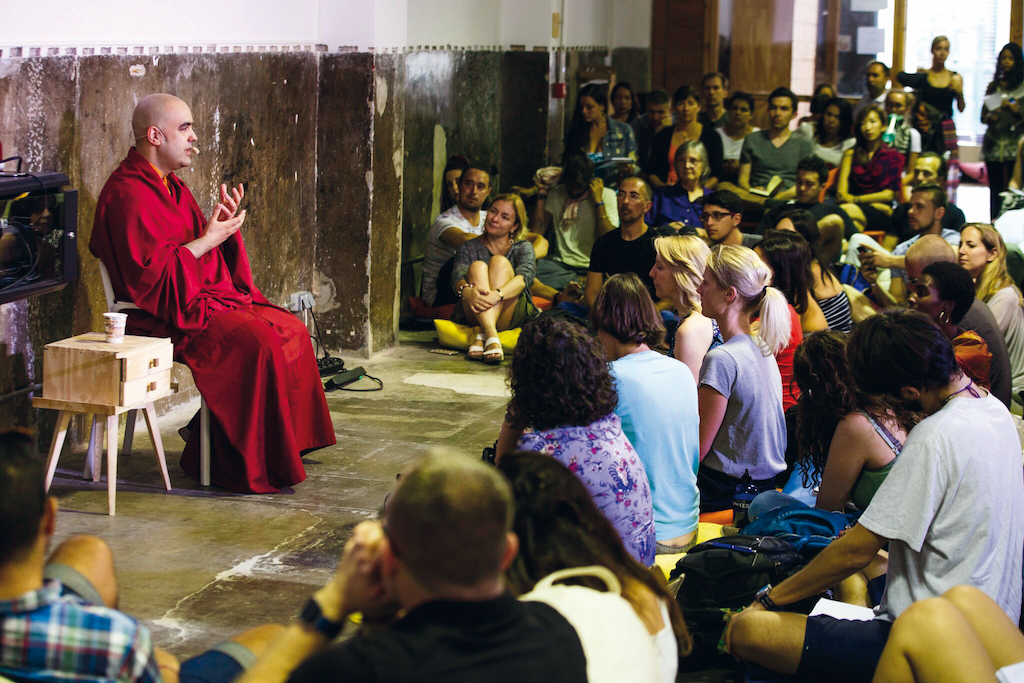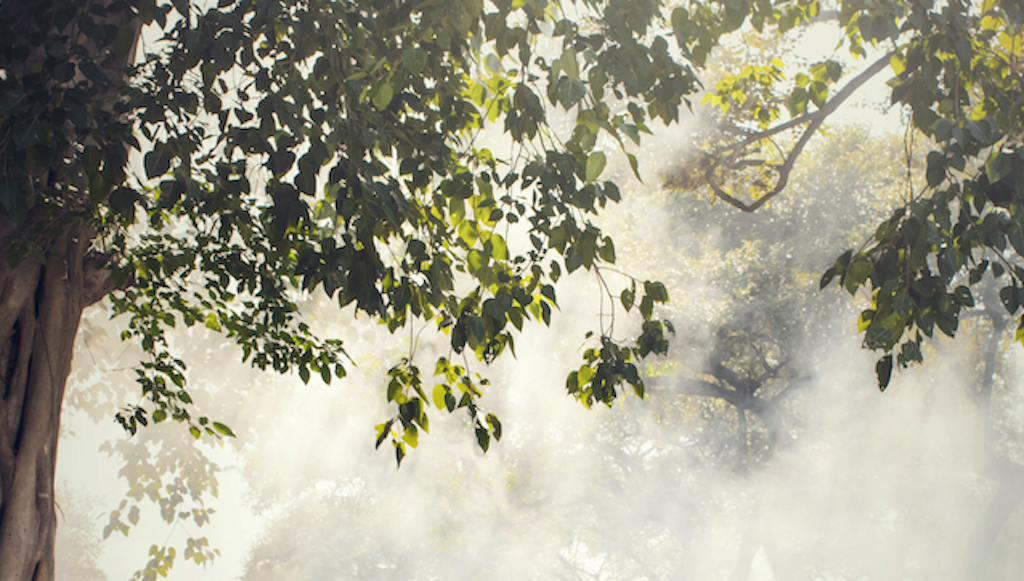A Monk’s Tale: Interview with Gelong Thubten
The story of a hard-partying actor turned globetrotting monk...
This post may contain affiliate links. Learn more
Gelong Thubten‘s journey from hard-partying actor to globetrotting monk is an extraordinary story of self-discovery, as he tells Lucy Cleland
If there was one group of people right now that British Buddhist monk Gelong THubten would like to impart a bit of his 26 years of teaching to, it would be our politicians. ‘Come on MPs in the House of Commons,’ he’d say. ‘Let’s try some mindfulness.’
A Monk of Many Robes
Meditation – or mindfulness (Thubten says the two words are interchangeable) – has penetrated Western consciousness of late thanks to celebrities – Oprah Winfrey, Gwyneth Paltrow and Nicole Kidman – and industry tycoons – Richard Branson and Arianna Huffington – among them – espousing its virtues in calming anxiety and reducing stress. It has become so mainstream that it has even infiltrated schools (brain breaks), hospitals, prisons, corporations and universities, and Gelong Thubten is one of its most famous teachers.
I catch him on the phone before he’s due to go on stage with Ruby Wax (who herself holds a Master’s degree in Mindfulness-based Cognitive Therapy from Oxford University) and Yale neurosicentist Ash Ranpura as part of a live tour of How to be Human, the bestselling book they collaborated on. My first question of what he is wearing is admittedly banal but I wanted to know if he threw on a pair of jeans behind closed doors or had a secret stash of leather jackets. But no, it’s monk’s robes all the way, albeit he has a few different versions – light cotton for summer, heavy wool for winter etc. Tomorrow he is flying to Peru to give a keynote speech for the UN at the Good Growth Partnership conference in Lima. Sublime? Ridiculous?
A Less than Smooth Path to Mindfulness
It wasn’t always this way. Thubten’s back story is one of serious depressive episodes, panic attacks and a burnout so bad, brought on by hard partying and a lack of self-care, that he was bed-ridden for two months. ‘I’m an extreme person,’ he says, a smile in his warm, clear voice at the end the of the line.
Thubten grew up in Cambridge, Oxford and London in a religiously and culturally liberal Anglo-Indian family. His mother is well-known actor Indira Joshi (currently playing Masood’s auntie, Mariam Ahmed, in Eastenders) and his father is a computer software programmer. And while Buddhism was certainly present in his life from an early age (his parents met when his father was returning from Thailand after being a temporary monk), he describes his upbringing as being spiritually very open to all religions.
When Thubten was 17, having gained a place at Oxford to read English, his parents divorced. He can’t, or won’t, say how much this impacted him emotionally but it can only be assumed that it has huge consequences for children however and at whatever age it happens. After Oxford, he pursued a career in acting in London, which eventually took him to New York. It was there that he ‘started to spin out with stress, unhappiness and anxiety’.
‘I felt I was on the run from my own mind. I enrolled in quite a progressive theatre school where we studied method acting. We were encouraged to delve into our pasts – and, for me, this brought on panic attacks. We were encouraged to explore parts of ourselves to give a good performance, but it was like having therapy with no therapists.’
Aged 21, and in a downward spiral of excessive drinking, eating rubbish and not looking after himself, Thubten hit rock bottom when one morning he woke up thinking he was having a heart attack such were the acute pains in his chest. Doctors told him he had atrial fibrillation (abnormal heart rhythm that can put sufferers at a five times more likely chance of a stroke), and he was warned to clean up his lifestyle to avoid severe consequences. After a couple of months in bed, being cared for by his mother, in which he turned to the Buddhist books in her apartment (she was also living in the States at that time), he eventually made the dramatic and life-changing decision to go to Scotland to the Kagyu Samye Ling Monastery, the first Tibetan Buddhist Centre to have been established in the West in the Sixties. ‘When you’ve really fallen apart, sometimes you have to do something radical to sort your head out.’
Four days after arriving, Thubten became a monk, as part of the monastery’s newly established system of one-year ordination. ‘During the ceremony the abbot said, “Now your old life is dead, and you’re reborn as a new person”. I felt such a relief.’
Four Years of Total Isolation
After a year of several hours of daily meditation and prayer ceremonies, plus his job of making the beds in the monastery’s guest house (visitors were always coming), Thubten realised he was only scratching the surface, so he chose to go into his first solitary meditation retreat for nine months. ‘It was during those months of intensive meditation that I started to really question what I was going to do with my life. Was this just a break or was I going to do something meaningful? I wanted to develop compassion and to do something to serve others. At first it was an agonising decision, but it led to me taking monk’s vows for my whole life.’ And he clearly has no regrets. ‘I was trained by the most amazing person – the renowned Tibetan master Choje Akong Tulku Rinpoche. He encouraged me to do retreats and also to give courses – to help people.’
If the thought of nine months of solitary retreat seems extreme, in 2005, after being a monk for 12 years, Thubten was ready for his biggest challenge yet: a four-year meditation retreat on the Isle of Arran with 20 other monks during which time he had absolutely no access at all to the outside world. ‘It was the most intense period of my life,’ he says. ‘Our schedule was around 12 hours of meditation each day, and pretty soon I was really shocked to see how much suffering and sadness I was carrying inside. I’d spend days in deep depression and anxiety where I’d want to throw down my robes and run back to my old life. The first two years were a huge struggle but with the help of the abbot I started to get to grips with meditating and learned how to forgive myself. I started to embrace the sadness and not push it away. The second half of the retreat was totally different, like going from night to day.’
On re-entering the world, he saw that the smartphone revolution had really taken hold – people had their noses buried in their devices and were scurrying around in high states of stress, always on the hunt for their next hit of dopamine. He was shocked.
Looking to a More Mindful Future
‘A very profound change has to take place,’ he says. ‘As a culture we need to recognise that greed doesn’t make us happy. My work with mindfulness is to try to get people to see that happiness comes from within rather than seeing it as a quick sensation or a buzz of excitement that we get from things, and which constantly has to be fed. Mindfulness can set us free.’
Thubten is now in high demand for his teaching. Not only does he work with companies such as Google and LinkedIn, but he has designed mindfulness programmes for fourth year medical students at the National University of Ireland and travels worldwide delivering talks and lectures. He was even asked by Marvel to train Benedict Cumberbatch and Tilda Swinton in meditation for the Doctor Strange film. This month he’s launching his first solo book, A Monk’s Guide to Happiness, Meditation in the 21st Century, and he will be giving a lecture for the How to Academy (18 June).
Frankly, his life sounds like the antithesis of what a monk’s should be. Does he ever reach for a chocolate bar and a coffee or is it brown rice and lentils all the way? ‘Oh, I can definitely reach for the chocolate,’ he laughs, ‘but I also love rice and lentils. And I make sure I practice mindfulness every day, even in tiny moments – such as when making a cup of tea.’ Does he miss anything about his old life? ‘No, nothing. I’m having a great time. I’m really enjoying my life.’ And with that our globetrotting monk goes off to take to the stage with Ruby Wax. Sometimes truth is stranger than fiction.
Gelong Thubten’s book, A Monk’s Guide to Happiness, is published in hardback by Yellow Kite, £12.99. gelongthubten.com
Your Turn to Take a Time Out
Two mini mindfulness practices by Gelong Thubten
Three-Minute Micro Meditation
- Take in the room around you. Explore the light, the shadows and any sounds.
- Feel the ground under your feet.
- Then focus on the contact between your body and the chair.
- Switch your attention to the texture of your clothing under your fingers, as your palms rest on your knees or the tops of your legs.
- Notice your shoulders. Maybe they feel tense or tight, but that’s OK.
- Become aware of the front of your body. Feel how the breath moves your body. Breathe naturally, without effort.
- Whenever your mind wanders, gently return to the present moment, using your body as the focus.
Sky Meditation
- Look at the sky: maybe it’s clear and blue, or maybe there are clouds.
- Your mind is like the sky: limitless and spacious.
- Feel as if your mind slowly mixes with the sky.
- Keep looking at the sky.
- When you feel distracted, remember that thoughts are like clouds, and the deep blue sky is always there behind them.
- Your mind is bigger than your thoughts.
- Imagine you’re looking beyond those clouds.
- At the end, close your eyes and focus on your body for a few moments.
DISCOVER MORE:
Best Meditation & Wellness Retreats in the UK / Wellness Festivals Around The World




